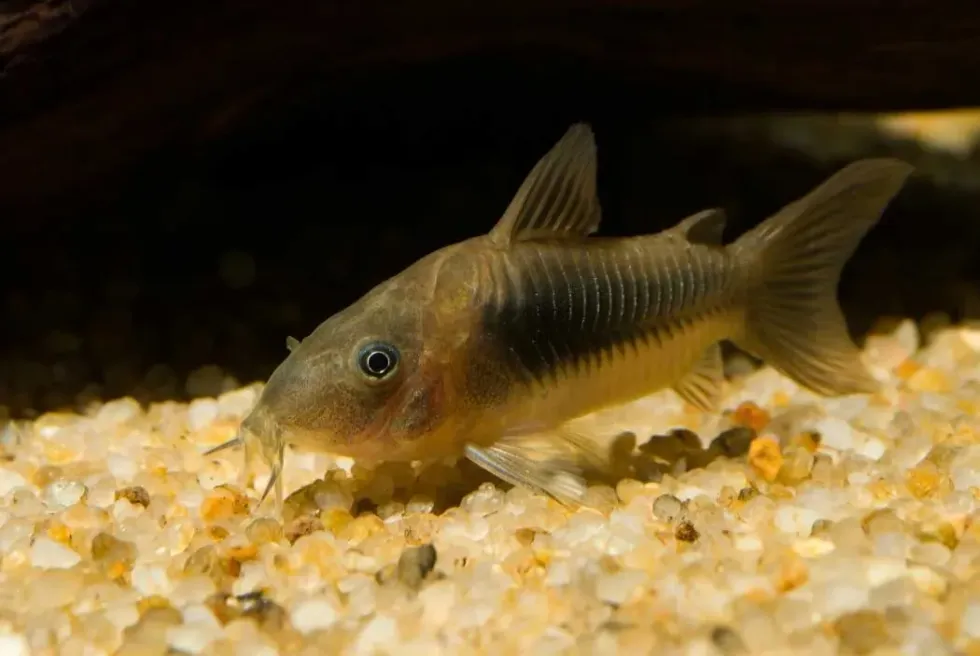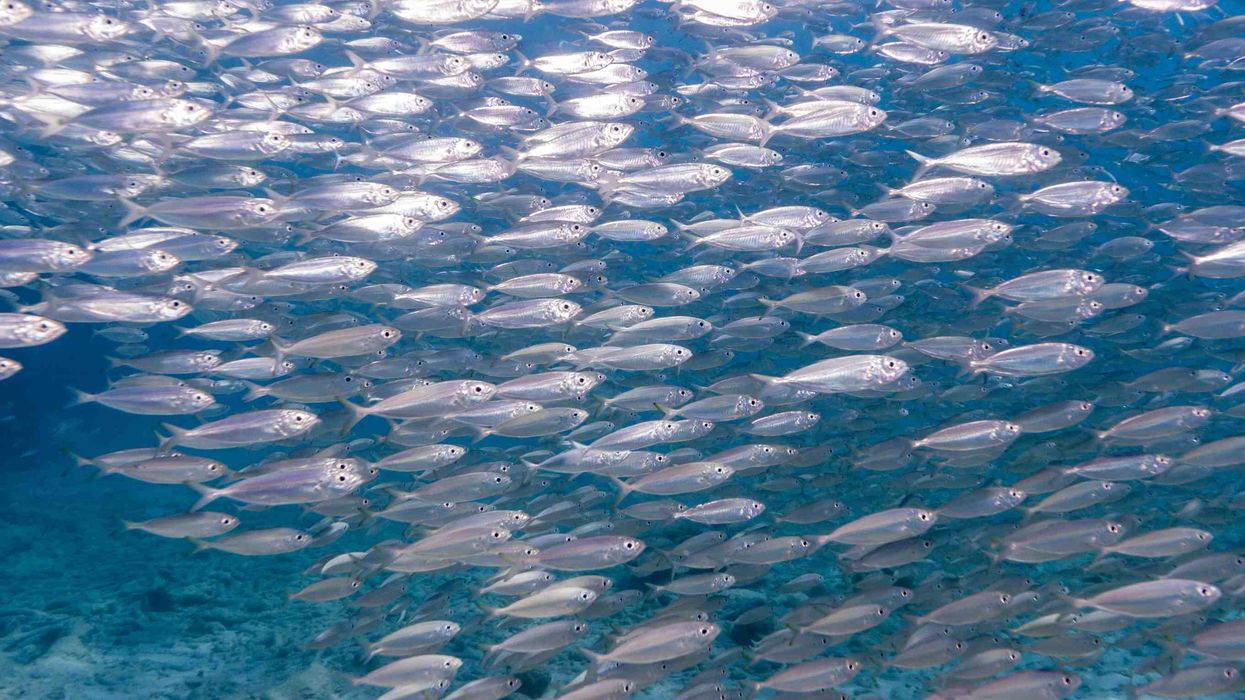A bronze corydoras (corydoras aeneus) is a type of fish that belongs to the class of Actinopterygii. It also goes by the name of bronze catfish. The basic breeding sites of corydoras are shallow waters, aquariums, water tanks, and slow-moving rivers.
There are only a few fishes that can survive in stagnant water, and the bronze corys are one of them. Even in the home aquariums, they are often seen darting to the surface in order to take a gulp of air.
They are schooling fish. Such fish appreciate being kept in a group of at least six or more in an aquarium or tank.
The cute fish stay really small in the home aquariums, whereas the females tend to grow slightly larger than the males. You can easily differentiate between the male and female bronze corys as the males tend to be smaller and more slender than females.
Their dorsal fin tends to have an additional sharp barb and with a mild poison which causes fishes that try to attack them to get stung. The females have a slightly higher body frame than the males.
Before breeding, these fish should be provided with high-quality flake food and also fresh or frozen bloodworms, and brine shrimp. However, the basic diet of the bronze corys includes small crustaceans, worms, insects, bloodworms, blackworms, daphnia, and brine shrimp. The process of spawning continues until the female has released all of the eggs.
Once spawning is complete, either the eggs or the fishes are moved to another tank. The eggs change their color and darken as they develop. Then the eggs hatch in about four to five days.
Here on our page, we have lots of interesting facts on the bronze cory that everyone will enjoy. Let's have a look at these interesting facts, and if you do like these, then do read our redtail catfish and spotted catfish facts too.
Bronze Corydoras Interesting Facts
What type of animal is a bronze corydoras?
The Corydoras aeneus is a type of fish. It is one of the most famous aquarium fish.
What class of animal does a bronze corydoras belong to?
The class of animal that a bronze corydoras (Corydoras aeneus) belongs to is Actinopterygii.
How many bronze corydoras are there in the world?
To give an approximate estimate of the exact population of the bronze corydoras across the world is difficult. Still, keeping in mind that these species of fish are free from the threats of becoming extinct, we can say that they are quite abundant in the world.
Also, their status is of Least Concern which further goes to prove that their population is stable.
Where does a bronze corydoras live?
The basic breeding sites of Corydoras aeneus (bronze corydoras) are shallow waters, aquariums, and slow-moving rivers.
The bronze cory is a very popular fish of South America from Colombia and Trinidad in the north all the way up to the south, at the Río de la Plata drainage and are found breeding in the various regions of Argentina in the south, all the way up to Columbia in the north.
What is a bronze corydoras' habitat?
Bronze catfish are often found living in shallow, slow-moving rivers and prefer areas with muddy water. However, they have also been found in fast-flowing rivers.
Since they have the ability to breathe air from the surface of the water, the bronze cory is one of the catfish that can survive in stagnant water. They are also most of the time found at an aquarium in stores and home aquariums as well.
Who do bronze corydoras live with?
The bronze cory is found living with a species of its own kind. When held in captivity in aquarium stores and tanks, it is seen to be co-existing with different other species of fish.
They are found living with a group of about 20-30 fish. It can easily live with tetras, swordtails, and other Corys, but you should avoid keeping it with cichlids and barbs.
How long does a bronze corydoras live?
The basic life span of a bronze corydoras catfish is about 10 years.
How do they reproduce?
Bronze corys easily spawn when kept in large groups of about 20-30 fish. Spawning takes place once the male approaches the female and, as such, sperms and one to two eggs are released by the males, which the female grasps onto with the help of its pelvic fins.
The female then deposits the eggs in a clean place.
After this, once again, spawning takes place, and a few more eggs get deposited. As such, the process of spawning continues for many days until the female has released all its eggs which can be up to 200-300 eggs.
What is their conservation status?
According to the IUCN, the conservation status of a bronze Corydoras aeneus is declared as Least Concern. This means that they are free from the threat of becoming endangered or even extinct.
To give a rough estimate of the corydoras bronze population is difficult, but keeping in mind the fact that they are free from the threats of becoming extinct, they are found to exist in quite an abundance. It is also known that there are different species of these fish, like the green corydoras.
Bronze Corydoras Fun Facts
What do bronze corydoras look like?
A bronze cory is very similar in appearance to the green corydoras with just the color variation. These fish are generally green, bronze, albino, and even black in color. They are known to have a yellow and pink body with a white belly.
Their dorsal fin is yellow and pink in color and immaculate. The region of their body is often green in color. It is the very reason why these fish are also known as green corydoras.
How cute are they?
Whether the bronze corydoras are cute or not is subjective. Why don't you be the judge of that and see for yourself? Look at these images of these gorgeous fish. Many people do find them very cute, which is why they are a crowd favorite when it comes to aquarium fishes. People love to keep them as pets.
How do they communicate?
The Bronze Cory communicates with the help of gestures and motions. They can also communicate with the help of noises like grunts, chirps, and pops.
How big is a bronze corydoras?
A bronze corydoras size is about 3 in (7.62 cm) long. They are known to be seven times bigger than an oriental cockroach.
How fast can a bronze corydoras swim?
To give an approximated estimate of their swimming speed is difficult, but they can swim at an average speed like the other breeding tank fishes. They can go up and down to the bottom of the very fast.
How much does a bronze corydoras weigh?
A bronze corydoras weighs about 0.002-0.3 oz (0.05-8.5 g).
What are the male and female names of the species?
The male and the female of these species do not have any separate names.
What would you call a baby bronze corydoras?
A baby bronze corydoras is called a fry.
What do they eat?
The bronze corydoras diet includes small crustaceans, worms, insects, bloodworms, blackworms, daphnia, and brine shrimp. It is also at times seen feeding upon plant matter.
Are they dangerous?
No, they are not dangerous. They are harmless to humans.
Would they make a good pet?
Yes, bronze corydoras do make good pets. They are well-known worldwide for being very famous aquarium fishes. People across the globe usually love to keep them as pets. If they are provided with the ideal and favorable conditions for their existence, they could really prove to be amazing pet fishes.
Did you know...
You can easily differentiate between the male and female bronze corys as the males tend to be smaller and more slender than females.
The process of spawning continues for several days between these fishes.
Keeping bronze corydoras
Bronze corys are known as schooling fish because they like to be kept in groups. These fishes can be kept in a group of 5-10 fish.
The bronze corydoras tank mates include a large variety of species of fish that are not too aggressive and are friendly in nature.
Some of these fishes include mollies, fancy guppies, platies, swordtails, neon tetras, angelfish, danios, and gouramis.
Corys should not be kept in a tank with oscars, Texas cichlids, or Jack Dempseys, as they tend to eat these corys and could even injure them. These Cory catfish do not die easily in the wild, but they tend to easily die if moved to a tank due to the stress of being transported.
Breeding bronze corydoras
To breed a bronze corydoras is very easy. When 20-30 of these fish are kept together in a water tank or aquarium, at least one or two breeding pairs will eventually be formed.
After that, you could ensure spawning by changing the water of the tank. You should also ensure that at least 50% of the water in the tank or aquarium is changed with water that is several degrees cooler than the breeding tank.
Before breeding, feeding these fishes with high-quality flake foods and fresh or frozen bloodworms and brine shrimp also serves as their diet during this time.
Keeping them well-fed is important. Once the breeding is done, make sure to either move the parent fishes or the eggs to a separate tank or aquarium.
Here at Kidadl, we have carefully created lots of interesting family-friendly animal facts for everyone to discover! For more relatable content, check out these blue parrotfish facts and catfish facts for kids.
You can even occupy yourself at home by coloring in one of our free printable bronze corydoras coloring pages.










